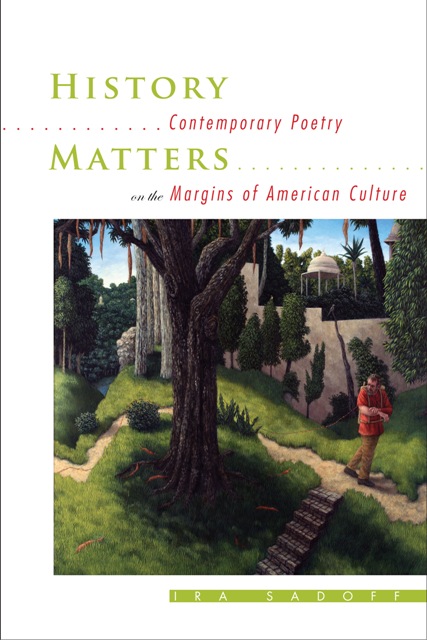Excerpt from Introduction
"Tomorrow would alter the sense of what had already been learned," John Ashbery, "Soonest Mended"
This book project began as an essay on jazz and poetry called “Inside/Out,” drawing parallels between poetry and improvisatory music, specifically artists who both work inside the boundaries of “the tradition” and those who play “outside,” without fixed signposts, what we sometimes call free jazz. In the essay I pursued correspondences between music and poetry because both arts provide aesthetic and philosophical models for how and why art moves us as readers and listeners, but they also provide strategies for artistic creation. Whether as artists we willfully choose an aesthetic or not, our aesthetic values are inevitably formed by the stimulation other contemporary artists provide us, by the history of the art, and by ideas and values that have interest and currency in the culture at large. That we live and write in history, which is the central conviction of this book, is both obvious and provocative: the so-called culture wars locate but also reduce and blur complex arguments about human nature, the nature of identity, the permeable relationships between the individual and the social world, and the spiritual and material. These conflicts ultimately suggest disagreements about the function of art: to preserve culture or to interrogate it.
I maintain that our concerns, our discourse and our sense of form are all subject to the pressures of the culture in which we live. In the twentieth and twenty-first centuries, scientific, psychological, and sociological theorizing gesture toward flux, relativity, and entropy, from Albert Einstein to Werner Heisenberg to recent studies about the mutability of personality. Philosophers like Jacques Derrida and Michel Foucault interrogate all systems of knowledge, including science itself, as ideological: knowledge, for them, serves as a regime of power. In this more complex social world, our understandings about what it means to be an individual, to maintain a stable identity, have also changed. What we desire turns out to be far from an interiorized or spiritualized experience that can be teased out or even momentarily deciphered.
Similacrum, as posited by Jean Baudrillard and Gilles Deleuze, is in some way the fulcrum of postmodernism: experience is not only subjective but also indirect; the forces that constitute the self are so multiply replicated, the word “self” is depleted of meaning. Identity is a convenient social fiction. These cultural pressures, these shifts in bodies of knowledge, influence the terms of poetic thinking and experience. We might consider love and beauty as universals, but the particulars of those experiences, increasingly in a globalized culture with speedy communication and an assault of sensory data, will obviously be drawn from and affected by our public as well as our private lives. So those words “love” and “beauty,” just by example, have different significations for us than they did for John Donne and Andrew Marvell.
One philosophical question our age requires of us and our art, then, is how do we meet these changes? In the past two decades, the increased interest in religion and the attempt to emphasize correspondingly stable institutions – marriage, the myth of creation – forces in our culture, have certainly provided conservative alternatives and resistance to secular and material engagement; the recurrence of interest in Buddhist sects and less rigorous popular self-help books that rely on “being present,” and “staying in the moment” points to our heightened discomfort in inhabiting our culture. These expressions of longing -- this desire to bring peace, wholeness, and retreat from entropy and a great cultural emptiness-- are not surprising. How could these concerns as well as others –feelings of helplessness, for example, feeling small and lost -- not appear with greater frequency in our artistic work now?
All the poets discussed in HISTORY MATTERS engage in a conversation about the import of history and the forces of change. Either by acts of resistance, resignation, or reconciliation, they grapple with experiential and artistic change. While avant-garde artistry often develops out of resistance to a dominant culture, much vigorous and engaged writing simultaneously explores, extends, appropriates, and interrogates that literary and cultural milieu. In the present moment, that adventurous writing occurs on the margins of representation and the postmodern, those binaries we associate with the tradition and the avant-garde. Artists like Igor Stravinsky and Pablo Picasso constantly reinvented themselves, continually responding to their artistic, intellectual, and cultural environments, making use of but not being enslaved by new artistic movements like modernism, futurism and surrealism; parenthetically, at a time when white artists made use of the sudden visibility of African culture in the early 1900s (African sculpture for Picasso, jazz for Stravinsky), they also shared – for better and for worse -- a mutual romance with the primitive. T.S. Eliot’s early avant-garde work was influenced by F.H. Bradley’s philosophical views. I think this same intellectual curiosity holds true for many of our most inventive poets; these artists on the margins all reflect on experience as mobile, which is to say they make themselves available to how experience continually alters us. This kind of innovation provides a temporal syntax, which in music we experience note by note and in poetry word by word as the work of art develops by associative logic; in a larger sense, that syntax simply means building on personal and artistic history: extracting what’s useful about the past and attentively revising those views as experience continues to unfold.
